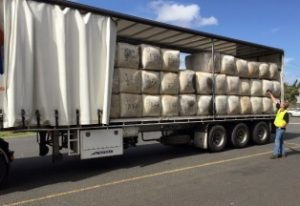AWEX’s Kerry Hansford demonstrates e-bale tag scanning in a 2016 trial.
ELECTRONIC transfer of wool clip information from farm to warehouse is being trialled in the second stage of the Australian Wool Exchange’s e-Bale project.
The AWEX board has approved stage two of its e-Bale project — an Operational Proof of Concept (OPC) trial between farms and receival warehouses, up to the point of shipping.
The trial aims to evaluate on-farm e-bale scanning, collation of wool book, specification and National Wool Declaration data and the transfer of this information into warehouse inventory systems. It will also test e-bale functionality at receival, core line and shipping points using mobile or fixed devices.
Work on the e-bale OPC has started, with an expected timeline of being implemented in early 2018, AWEX said.
Click here to get the latest Sheep Central story links sent to your email inbox.
AWEX chief executive officer Mark Grave said AWEX has been working with machine readable technology for more than 15 years and the work is at a point where a broad scale project and evaluation is required.
“AWEX’s e-Bale OPC represents a real time opportunity to evaluate the potential use and impact of adopting machine readable technology in a simulated on-farm to warehouse supply chain.”
The OPC stage follows extensive wool pipeline tag testing and reading research, including farm-to-store trials with wool brokers Elders Ltd and Moses and Son and wool grower clients. New England Wool and Modiano Australia purchased wool for their mills in Biella, Italy and Nejdek, Czech Republic, and the companies contributed to store-to-mill trials. Between 2013 and 2015, trials were undertaken to assess if any commercial or experimental tags could survive the dumping process and be read in a tri-pak.
e-Bale OPC to test farm to warehouse wool data transfer

Reading e-bale tags on a truck. Picture – AWEX.
AWEX wool service manager David Cother said the e-bale trials had identified an ultra high frequency tag costing less than $US1 that could withstand bale dumping, be read in a tri-pak or on a loaded truck, and be read from more than two metres, depending on the reader type used.
In the OPC trial, on-farm wool book, specification and National Wool Declaration data will be associated with a bale’s unique e-bale reference number, so that this information is immediately available when the bale is scanned at the warehouse, he said.
“It is really just collating that information electronically and tying it in with the e-bale (reference number).
“So that is in their system when the bale arrives.”
Mr Grave said the use of a unique RFID tag that can survive the pipeline has garnered interest and active participation from warehouses, dumps, exporters and processors.
“AWEX has worked closely with stakeholders in these sectors, most of whom have contributed financially and in-kind to the advancement of this project.”
“A key component of the e-Bale OPC will be the ability to evaluate the potential benefits of accessing accurate on-farm data for use further through the supply chain.
“In addition, the traceability of agricultural products from farm through the supply chain is relevant to Australia’s biosecurity interests.”
Mr Grave said the OPC project is significant for the Australian wool industry, in terms of its detail and opportunity to demonstrate benefits to the pipeline.
“AWEX will continue to work closely with industry stakeholders and growers to develop a clear communication strategy for this project.”
The full objectives of the e-Bale OPC are:
To scan e-bales on-farm using a phone/mobile device based application,
To collate the equivalent of wool book, specification & NWD data and transfer the data securely from farm to the nominated receival warehouse,
For receival warehouses to import farm data into their inventory systems, and
For receival warehouses to test e-bale functionality at nominated control points (e.g. receival, core line, shipping) using either mobile or fixed devices.
AWEX is hoping that e-bale will be adopted on an industry-wide basis, with the preferred tag becoming part of AWEX’s Wool Pack Standard.
Click here to read the paper ‘e-Bale: The potential radio frequency identification of wool bales’, presented to the International Wool Textile Organisation in April 2016.



HAVE YOUR SAY